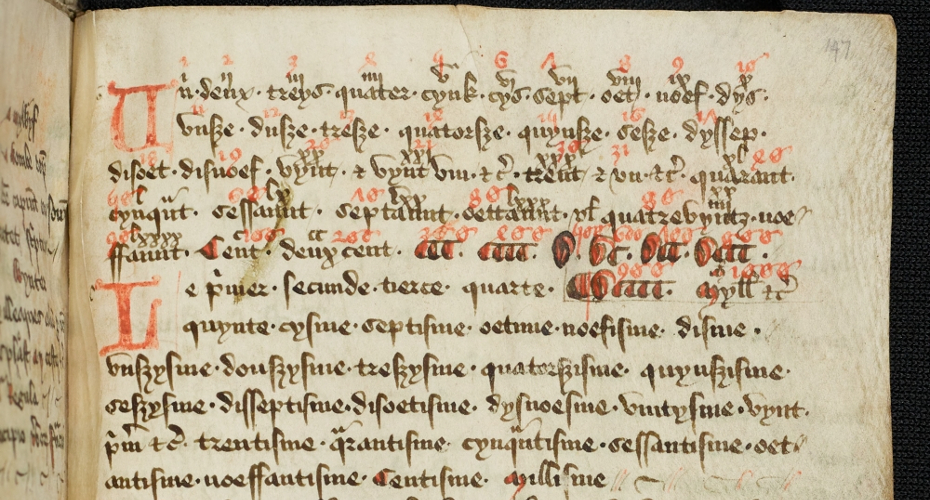European research grant to fund ground-breaking study of French language learning in medieval Britain

An example of a French manuscript
A new study into how medieval British society created a culture of language learning through French has been launched thanks to a prestigious research grant.
The European Research Council (ERC) Consolidator Grant – one of three to be awarded to the University of Exeter – will fund a five-year project that will, for the first time, gather and examine the earliest known books used to teach a modern European language.
Learning Anglo-French: French Language-Learning Manuscripts in Britain, c.1200–c.1500 will explore whether there was a defined curriculum for teaching French, and consider related aspects, including what impact the Black Death pandemic may have had upon language acquisition.
It will also harness cutting-edge archaeological techniques to analyse the manuscripts themselves, potentially revealing new insights into how they were produced and the people who handled them.
The project is being led by Dr Thomas Hinton, Senior Lecturer in French in the Department of Languages, Cultures and Visual Studies, who has been awarded more than £1.6m as part of the EU’s Horizon Europe programme. It expands on Dr Hinton’s research into Walter de Bibbesworth’s Tretiz, which is understood to be the first language book of its kind used in England.
“Manuscripts of this nature present to us an understanding of language learning within a particular setting or community,” said Dr Hinton. “What makes this project so exciting is that it brings together this unique body of work – the earliest known group of books used to teach a modern European language – to see how, where and to whom French was taught in Britain, and help us understand the cultural and social context in which that took place.”
The first phase of Learning Anglo-French will establish a database of around 50 manuscripts that have been identified as containing material used for teaching. Their contents and contexts will be recorded, including where they were made and who owned them. The team will also visit archives across the UK in search of hitherto undiscovered learning books.
With the expert input of Exeter archaeologists, the project will go on to conduct DNA analysis of some of the parchment used in the manuscripts to see whether further insight can be gleaned into the type of animals used in the production process, or the gender profiles of those reading the books.
The European Research Council’s Consolidator Grants are designed to support excellent researchers at the career stage at which they may still be consolidating their own independent research team or programme. To qualify, applicants must demonstrate the ground-breaking nature, ambition and feasibility of their scientific proposal.
In total, 321 researchers were awarded €657 million in funding across Physical Sciences and Engineering, Life Sciences and Social Sciences and Humanities. Professor Stefano Pagliara, of the University of Exeter’s Living Systems Institute, and Dr Katy Sheen, of the Centre for Geography and Environmental Science, were also successful in applying for a Consolidator Grant.



